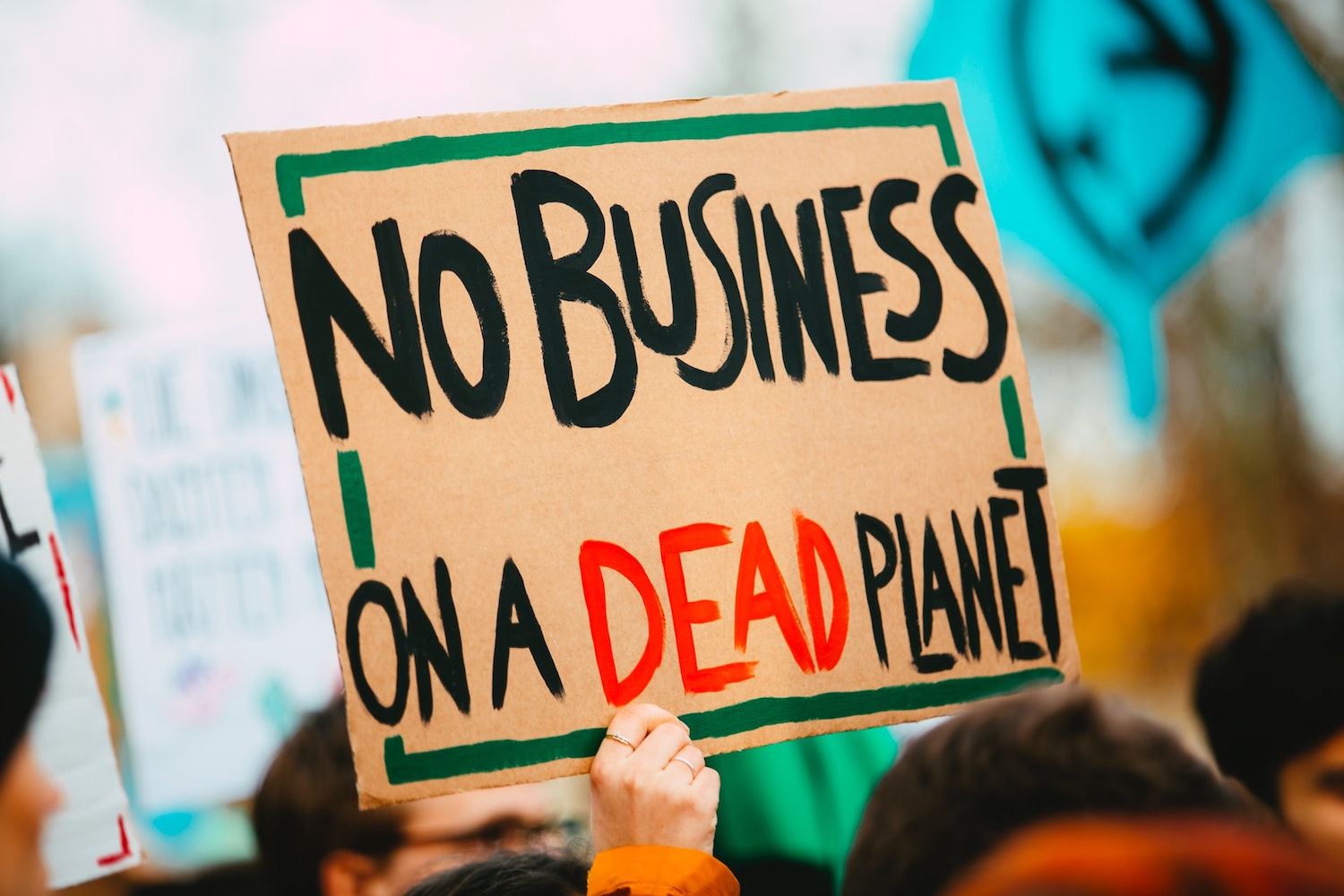
The world is “going in the wrong direction” on climate change, according to a report released this week by the World Meteorological Organization. “Heatwaves in Europe. Colossal floods in Pakistan …There is nothing natural about the new scale of these disasters,” U.N. Secretary General António Guterres warned in a video message on Tuesday. “The current fossil fuel free-for-all must end now. It is a recipe for permanent climate chaos and suffering.”
It's the latest in a string of dire warnings about the climate crisis, and while the business community often talks a big game on climate action, recent research indicates they often fail to follow through — and that's a major problem.
G7 company emissions fall short of global climate goals
Despite the lip service, companies in the Group of Seven (G7) are falling short on their plans to tackle climate change, according to a study released last week by the nonprofit disclosure platform CDP and management consultancy Oliver Wyman.
As of now, corporate commitments in the G7 — which includes the U.S., U.K., Canada, France, Germany, Italy, Japan and the European Union — align with 2.7 degrees Celsius of global temperature rise by 2100. That's a far cry from the 1.5-degree target set out in the Paris climate agreement, and even from the 2-degree threshold scientists agree will be a major tipping point for catastrophic climate impacts.
The report shows companies in Germany and Italy have the most ambitious plans to reduce emissions, while those in Canada, the U.S. and Japan are lagging furthest behind — largely due to "companies completely lacking targets, rather than targets that lack ambition," CDP said. In Canada — the lowest performing country in the study — less than half of all corporate emissions are covered by any form of reduction target, compared to upwards of 90 percent in Europe.
Editor's note: Be sure to subscribe to our Brands Taking Stands newsletter, which comes out every Wednesday.
“The most important driver of rapid emissions reductions in line with the Paris agreement is ambitious target setting," Laurent Babikian, global director of capital markets for CDP, said in a statement. "It is not acceptable for any country, let alone the world’s most advanced economies, to have industries displaying so little collective ambition."
Even fractions of a degree in temperature rise can have a massive impact. The difference between 1.5 degrees and 2 degrees Celsius, for example, increases the likelihood of ice-free arctic summers tenfold, nearly triples the number of people at risk of exposure to extreme heat events, and doubles the impact on marine fisheries and crop yields, according to the Intergovernmental Panel on Climate Change (IPCC).
"Momentum is growing, but as we approach COP27, we must get our [1.5-degree] goal off of life support," Babikian added. "High-impact companies, and their investors and lenders, must immediately set and honor targets with credible transition plans."

Oil and gas firms’ low-carbon investments fail to match their promises
Speaking of lip service, oil majors are spending hundreds of millions of dollars on publicity campaigns to portray themselves as proactive on the climate crisis, yet only around a tenth of their investment actually goes toward decarbonization, according to a September study from InfluenceMap, which tracks corporate and industry association lobbying on climate policy.
Together, the five "supermajor" oil companies — BP, Shell, Chevron, ExxonMobil and TotalEnergies — spend around $750 million each year on climate-related communications, according to the study. Across 3,421 items of public communications from the companies in 2021, 60 percent contained at least one sustainability claim, while only 23 percent contained claims promoting oil and gas, according to InfluenceMap's analysis.
That seems a bit off balance considering only 12 percent of these companies' 2022 capital expenditure is forecasted to go toward low-carbon activities — and some of those supposedly low-carbon efforts include gas projects. All of the companies, with the exception of BP, plan to increase oil and gas production between 2021 and 2026.
"... None of the companies have aligned their climate policy engagement activities with the goals of the Paris agreement, and retain a dense and global network of industry associations globally, which are highly active in their opposition to Paris-aligned climate policies," the researchers concluded. "The findings raise serious and persistent questions for regulators and the companies’ shareholders, as well as PR and advertising agencies, media and social media platforms that work with the companies."
But the public — and, increasingly, investors — are growing wise to the game. "Investors can already see there is a disconnect between companies’ climate pledges and their actions, most notably their capital expenditure toward decarbonization," Laura Hillis, director of corporate engagement for the Investor Group on Climate Change, added in a statement. "This research ... provides further proof that companies are not putting their money where their mouth is. Investors want to see companies genuinely commit to and plan for the transition to net zero emissions — not more greenwash."
The Business Roundtable backs off its bold words
Three years ago, the Business Roundtable — a CEO-led coalition representing around 200 of the world’s largest companies — issued a statement revising the “Purpose of a Corporation” to serve all stakeholders, not just shareholders, with a focus on promoting environmental sustainability and social equity alongside profit.
Many in the sustainability community — including TriplePundit — pointed to the move as a sign of change, but three years later, the group appears to be backing off those words. In a post published on Medium in August, which was intended to reinforce the 2019 purpose statement, the organization omitted any mention of the environment, Fortune reports. Meanwhile, a recent analysis from the Guardian shows the group continues to lobby in opposition to U.S. climate policy.
"In public the Business Roundtable’s leaders are still committed to change," observed Adam Lowenstein of the Guardian. But the paper's analysis finds that the group has lobbied against key climate provisions behind the scenes — including a multimillion-dollar campaign against President Joe Biden's Build Back Better plan, which contained over $500 billion in funding for decarbonization. More recently, the group opposed the U.S. Securities and Exchange Commission's plan to require that publicly-held companies disclose their carbon emissions and exposure to climate risk.
"In addition, by advocating and lobbying against government action on issues like climate change, the Business Roundtable gives its members space to publicly endorse (and claim credit for endorsing) legislative and regulatory action," Lowenstein continued. “Some individual companies aren’t going to write in and rage against the proposal because they know that will raise concerns with their investors, so they let some of the trade groups do that work for them,” Allison Herren Lee, the SEC’s former acting chair and commissioner, told him.
Hope for the future? Business leaders convene at Climate Week on the road to COP27
While these studies analyze large groups of companies in aggregate and do not necessarily reflect every firm's ambition, collectively the findings indicate, at best, a lack of authenticity — and we know that doesn't work with the public (or employees, investors and so on), at least not for very long.
For example, around 60 percent of U.S. and U.K. adults believe businesses are responsible for considering the impact of their actions and operations on local communities and the environment, according to 2021 research from Salesforce. Clearly business leaders know this — and that's why they feel compelled to communicate with the public about their climate plans. But as we've seen through our ongoing coverage of brands taking stands, a stake in the ground means nothing if it isn't authentic — people will figure it out eventually, and they won't be happy. That's why it's no surprise that a whopping 77 percent of respondents to the same Salesforce survey say businesses aren't doing enough on climate in particular.
The good news is that, again, every fraction of a degree matters — and businesses can still make a big impact for the better. Leaders who say they're intent on doing just that will showcase their plans during Climate Week in New York City next week, with events hosted by the U.N., the Financial Times, Business Fights Poverty and more. "Governments and businesses must work together to tackle these pressing issues to ensure that no one is left behind,” said Sanda Ojiambo, CEO and executive director of the U.N. Global Compact, which works with companies on sustainable development. Check back to TriplePundit next week for our coverage.
Image credit: Matt Palmer and Markus Spiske via Unsplash

Mary has reported on sustainability and social impact for over a decade and now serves as executive editor of TriplePundit. She is also the general manager of TriplePundit's Brand Studio, which has worked with dozens of organizations on sustainability storytelling, and VP of content for TriplePundit's parent company 3BL.














